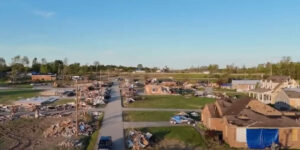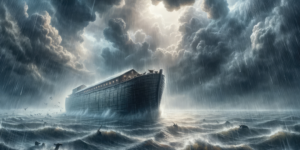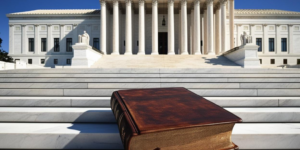The Battle to Stop Cancel Culture from Erasing our Founding Fathers from America’s History
Author Douglas MacKinnon, a former White House and Pentagon official, is on a mission to stop contemporary culture from canceling the Founding Fathers.
MacKinnon’s new book, The 56: Liberty Lessons From Those Who Risked All to Sign The Declaration of Independence, explores the stories of the 56 men who signed the Declaration of Independence. Through that lens, MacKinnon puts forth why he believes culture shouldn’t cancel the Founding Fathers.
“These men were so courageous in the face of what they considered to be certain death and certain punishment,” he said. “Because … when each of those 56 men decided to sign the Declaration of Independence … each man was signing his own death warrant.”
MacKinnon says these men stepped up despite the potential costs because their desperation drove them toward liberty. They wanted to “get the foot of the crown off their throats” while protecting their faith.
“What was most inspiring was the courage of those 56 men to do that against all odds,” he says.
MacKinnon said many people today are looking back at the Declaration and the Founders through a negative lens—something that sparked the author’s quest to try and right this wrong.
“I did a little tour of some of the more liberal networks and sites out there [last year], and I saw voice after voice from the left calling, not only for the cancellation of the 4th of July but the smearing and cancellation of the Founding Fathers—of these 56 men,” he said. “They’re viewing the activities and judgment and thoughts of men and people from 1776 through the prism of 2022.”
MacKinnon said that the American left has dominated what he called the “five major megaphones of our nation”: the media, academia, entertainment, science and medicine. And now everything is being presented in these arenas, he believes, through a liberal lens.
“It’s impossible to know what was in the ‘hearts and souls’ of the Founding Fathers,” MacKinnon argues, particularly regarding some of the more complex issues.
“The United States of America is a work in progress … none of us is perfect. None of us is flawless,” he says. “All of us are sinners, and the 56 men who signed the Declaration and all of the Founding Fathers were not perfect. They were flawed.”
MacKinnon continued, “But they were trying to do the best they could under the circumstances of those times … when, oh, by the way, the British were just trying to hunt them down and kill them.” Some signatories of the Declaration saw their homes burned to the ground, their wives arrested, their sons murdered and their livestock slaughtered. These horrific acts came because of their willingness to sign the Declaration.
With these realities in mind, MacKinnon said it’s essential to learn from the negatives in our history and to praise and build upon the heroics and positives.
The Declaration of Independence has inspired people around the world—a rare feat for similar documents and proclamations penned throughout history.
“They built a republic and then a nation that, over the last 250 years, has been a beacon of hope to people around the world,” MacKinnon says. “These men were not perfect. They were flawed, but they were trying to do the best they could, and their genius and their courage is something that should always be celebrated and never canceled.”
He went on to warn that the cultural circumstances of today are profoundly precarious and, in some ways, more problematic than the struggles seen during the Founders’ era.
“The tyranny of 2022, in many ways, is exponentially more dangerous than the tyranny of 1776,” he said. “And we just need to talk about it.”
MacKinnon hopes The 56: Liberty Lessons From Those Who Risked All to Sign The Declaration of Independence helps set the record straight on the Founding Fathers while also recapturing truth.
“We have to start having the conversations amongst ourselves that … the United States of America as founded by these 56 men is unraveling before our eyes,” he says. “We have to become people of faith that jump into that arena and fight for our rights.” {eoa}
For the original story, visit our content partners at faithwire.com.






































